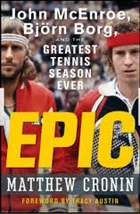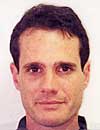Daniil Medvedev:
Rise, Fall, And?
Matt Cronin

The Russian is looking for another winning run – "You feel like you're untouchable, and you know that everything you do, turns into gold."
But can he and are technical limitations in his game making that less likely?
A couple years ago, Russian Daniil Medvedev won the 2021 U.S. Open, essentially because he finally knew the way he should play. He became ultra consistent with both his powerful forehand and his pinpoint backhand.
And the 6'6" player was a great mover even with his height, keeping balls in play until he wore his opponents down. He was so focused, serving huge, and his return was spot on.
How Should He Play?
That didn't just happen at the start of the Open. When Medvedev first came onto the ATP Tour, he was mediocre, and was less sure what to do, even though he was very competitive and could get emotional on court.
So Medvedev practiced all the time, refining his stokes. He did not immediately chop down all the great players, yet, but he moved closer and closer.
In 2019, he found the game that would turn him into a Grand Slam champion. He had to decide what type of player he is -- a big hitter going for winners or a careful baseliner constructing points.
What he started to do was reduce the risk in his play. When he is mentally sound, he gets the ball back repeatedly instead of going for a winner straightaway.
Playing far behind the baseline with his unorthodox strokes, he can hit down the line, and go crosscourt both sides. He does not smile that much on court, but when he hits an amazing winner, he cheers in front of the fans.
Yes, once in a while, the Russian hit with spin, but in general his strokes were very flat. His backhand is often hit on the rise, and he can pound it. (For his spin values in relation to other pros, Click Here.)
When he is on, Medvedev can hit his forehand very close to the lines hour after hour. His opponent may push him way back into the corners, but Medvedev has enough foot speed to keep getting the ball back. He can also yank the ball around, and the other players have to try to anticipate that.
But as John Yandell has shown in his analysis of Medvedev's forehand, there are problems in his forehand technique. (Click Here.) His turn is less than other top players. He has that high large backswing that takes more time than other top players.
His contact is barely at the front edge of his body. And the extension of his swing is limited, causing him to reverse many finishes and even having to duck to keep from hitting himself in the head on his followthrough.
He has similar limitations on his backhand. His contact is barely at the edge of the body, much later than the great two handers.
And like his forehand, the extension of his swing is very compressed. He is not a pretty technical player and watching him can be exhausting.
Results?
Medvedev showed himself to be vulnerable this last year. The 26-year-old had a very decent year, but a long way from his big 2021. In 2022 he won two titles, in Los Cabos, Mexico, and Vienna, Austria. Just two.
But it all goes back to the start of the year, in the final against Rafa Nadal at the 2022 Australian Open, where the Spaniard edged him 7-5 in the fifth set. There were some incredible rallies, but from two sets down, Nadal rose up — with his stunning forehand and at the net — and Medvedev could not find a way to hold him off.
Though he reached No. 1 in the next few weeks, Medvedev was hurting from that defeat and began to slide. He went down against a bunch of Top-20 players such as Gael Monfils, Hubert Hurkacz, Marin Cilic, and Roberto Bautista Agut. He's never liked clay, and then was on the sidelines when the Russian players were banned from Wimbledon.
He had a bad first half of the season, but thought that back on his favored hard courts, maybe he again could snag the U.S. Open. But the temperamental but terrific player Nick Kyrgios powered through Medvedev in Montreal. In Cincinnati, he looked very good, but Stefanos Tsitsipas beat him 6-3, 6-7(11), 7-6(1). Medvedev was right there, but it wasn't quite enough.
In New York, Medvedev looked stellar for three matches, but once again, he faced Kyrgios, under the lights in a big fourth-round encounter. The Australian was on fire, with some eye-popping shots, and Medvedev could not control himself.

So the No. 1 spot was now gone. "So that's not nice because honestly after such a match, when you lose in Grand Slam, look, I'm trying to look good here, but I'm disappointed. Not going to cry in the room, but I'm a little bit disappointed," Medvedev said.
"For few days I'm going to be just a little bit sad, looking at my phone, my laptop or watching some series on TV.
"But that's motivation, try to do better. Obviously it was the last Slam of the year.
"Didn't win in Australia when I had the chance. Didn't get the chance to play Wimbledon. Roland Garros, lost fourth round. Yeah, should do better."
But he didn't, especially in his final event of the season, when Medvedev lost all three of his round-robin meetings in a third-set tiebreaker in the ATP Finals, against Novak Djokovic, Stefanos Tsitsipas and Andrey Rublev.
Though he's one of the few players to have won a Grand Slam by beating one of the Big Four, he's not at their level yet.
"Novak is a league of his own, that's for sure, with Rafa and Roger. Then it's the rest," said Medvedev. Maybe one moment somebody's going to try to catch their number of Slams, then we going to talk about different.
"I definitely don't put myself in there. We had some tough battles. But I am definitely, definitely not close to Novak. Maybe when we play, yes, but in general you cannot compare myself to him or any one of the big three."
Yes he fizzled this season, but is still a smart player. Can re-set from here? He has to improve his serving. If you look at his serve in the High Speed Archives, he lacks body turn, and on his first serve, his racket is literally vertical at contact, limiting or eliminating the critical topspin component that even pro first serves typically have.
And he has get better at the net, and a bit more creative. If he wants to win another Slam the Russian also has to be more assertive when he gets down — especially against the top players.
He says he will keep looking for ways to climb back up—even if he won't say what they are. "We all want to win. If you leave your secrets, you're going to be more vulnerable," he said.
"But there are some matches where you feel like you're untouchable, and you know that everything you do, turns into gold. I'm confident I'm going to be able to do something big in the future. Just need to continue working."
Let's see if that happens in 2023.






